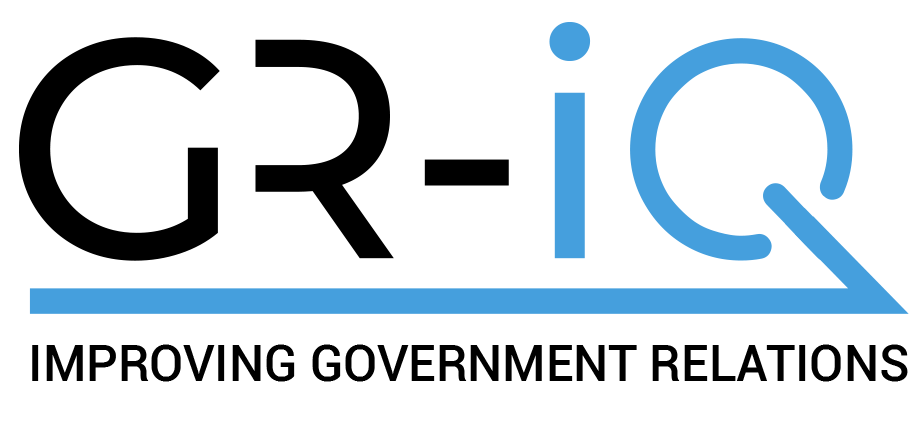What dilemmas are you facing?

The GR functional leader
What you do: You run the External Affairs or Government Relations function in an ever-changing environment. Just like the other functions supporting the business – HR, Finance, Legal and IT – you look to do so in the most (cost) effective way.
Things you ask yourself: How effective is GR at fulfilling its role? How can we maximize the value our function brings to the business and demonstrate that we do so? And how can we minimize the associated risk, including the risk of non-compliance? How can we be sure that we remain aligned with the business throughout the business cycle? And see to it that GR constantly sharpens its ability to help safeguard the long-term future of the company?

The Board member or advisor
What you do: You run the business or you have an oversight role in or advisory role to the Board. You rely on the Audit committee to provide assurance against agreed company standards or you are putting a team together to advise your client on strategic challenges.
Things you ask yourself: What assurance do we have that GR is fulfilling its role effectively? Who knows what the relevant standards are to test this function’s performance against? How do we know whether GR properly manages risk and reward in what is a sensitive operating theatre? And how do we decide which interventions will safeguard or increase the contribution of this group of professionals to the business?

The M&A Transactions Consultant
What you do: You support corporate clients as they change their portfolio by buying and selling businesses and assets. You conduct buyer’s and seller’s due diligence and advise accordingly.
What you ask yourself when supporting a buyer is: What if the value of the entity in question is dependent to a large extent on the relationships with local government? How do I know what good looks like? What if the target’s assets are in countries the buyer and us are unfamiliar with?
What you ask yourself when supporting a seller is: What if the business being carved out is in an industry that is heavily regulated and needs an instantly effective government relations team that seller cannot offer the buyer in the sale? How would we limit the discount the buyer may claim?
GR HEALTH CHECK
You require a fast assessment of the state of affairs of the Government Relations function. We come in on short notice and provide a high-level analysis in a matter of weeks, depending on availability of key individuals.
Typical clients are GR Directors, (incoming) CEOs, Board-members or M&A Transaction Services teams on due diligence assignments. Feel free to sample the assessment tool we developed: E-GRAM
GR STRATEGY
You are looking for help to define the vision, mission, ambition and roadmap to bring the Government Relations function from ‘good to great’.
A strategic roadmap to achieve the outcomes you need would typically take a few months.
Typical clients are Government Relations Directors responsible for the function or CEOs or other executives with the Public Affairs function in their portfolio.
GR TRANSFORMATION
You need guidance and leadership to execute the desired projects in your organization and ensure the change is implemented. We help you create a team of internal and external experts (from our network and yours) to set up a program office within your organization and implement the change.
Depending on your requirements, this Program Office would be managed by your own staff or by us.
The GR-IQ Five Lenses Methodology
GR-IQ’s unique comprehensive analysis methodology uses data to generate a roadmap for your Government Relations function.
Standard Operating Models
The GR and ER Standard Operating Models are the anchor point for our assessment work. We created them on the basis of our work in the energy industry and finetuned them through engagements in other sectors.
The governing and enabling processes between both models are the same. The core processes are different.
We use the ‘GR-IQ’s standard GR and ER operating models’ © to articulate the challenges and opportunities for your organisation.
We are happy to share them with you. Let us know if you are interested.
GR Standard Operating Model
GR is a supporting function with a strategic remit, creating and protecting value for the enterprise. It is worthwhile reviewing GR’s processes from time to time, such that they remain integrated, fit-for-purpose and focused on the right objectives. Corporates doing so frequently can unlock significant value.

ER Standard Operating Model
ER is a supporting function to help manage brand value and reputational risk. More depends on well defined processes than in GR. It is worthwhile reviewing ER’s processes from time to time, such that they remain up to date, support efficient execution and benefit from best in class (external) solutions. In support of building out your reputation.

Typical Industries
WHICH SECTORS CAN BENEFIT MOST?
Industries where our services add most value share a number of characteristics:
– Owners and developers of physical assets for the long-term
– Active in most regions or globally
– Considering the host government their partner
– Adding significant value to local economies
Think of the oil and gas, chemicals, mining, utilities, transport and building sectors and their suppliers and service providers. We believe our approach can also benefit pharmaceuticals, banking and technology sectors.



Why rely on GR-IQ?
GR-IQ was founded by Paul Beijer who earned his spurs in close to twenty-five years of extensive corporate management experience. Prior to GR-IQ, Paul was Vice-President of Government Relations at Royal Dutch Shell, where he was responsible for Strategy, Planning and Assurance. Through his work, Paul guided the strengthening and professionalization of the GR function. He is credited with helping create the backbone for one of the most influential groups of corporate diplomats in the world.
Before Paul’s work in GR, he held senior Strategy, Finance and Risk management positions across Shell’s businesses, based in the Netherlands, United States, United Kingdom and Germany. He worked with over 40 different nationalities and has access to a wide and deep network of professionals across the globe.
Paul earned his MBA degree at Groningen University (1994) and more recently completed executive programs at IESE (2019), Erasmus Governance Institute (2019), INSEAD (2011), IMD (2005), London Business School (2004) and Kellogg (2000).
Paul’s focus and passion is to bring strategy, structure and process to a people- and relationship-oriented field in the context of global affairs.

Processes & Tools
GR and ER teams increasingly rely on technology to create intelligence and insights at the push of a button. This enables you to spend more time on strategy, relationships and influencing. What technologies can help you push the boundaries and free up more time? How do your teams work today? And what choices to make to reap the benefits of technology?
These are typical questions GR-IQ can help you answer.

Leadership & Culture
GR and ER leaders and practitioners are unusually adept at relating to external stakeholders, identify what motivates them and finding common ground. Those same qualities can bring out the best in your teams. What behaviors would you like to see your managers demonstrate with their staff? What behaviors are currently on display? How to bridge the gap?
These are typical questions GR-IQ can help you answer.
The GR-IQ Methodology
GR-IQ’s unique comprehensive analysis methodology uses data to generate a roadmap for your Government Relations function. We look through five lenses at your operation to map out what deserves attention and what to do.
5 lenses
Professionalism & Competence
Planning & Analysis
Governance & Organization
Processes & Tools
Leadership & Culture
The GR-IQ Methodology
GR-IQ’s unique comprehensive analysis methodology uses data to generate a roadmap for your Government Relations function. We look through five lenses at your operation to map out what deserves attention and what to do.

Professionalism & Competence
GR and ER practitioners bring a unique set of strengths to their jobs. They have a strategic mindset, build strong networks and communicate effectively. But what qualities are needed to deliver exceptional performance? How does your organization stack up again those competencies? And which areas need attention to bridge the gap?
Find the answers to these questions in three steps as described on our Government Relations Competence Assessment.

Planning & Analysis
GR and ER organizations – like any other functional group – are expected to demonstrate how much value they add to the business. The organization exists to support the company achieving business objectives. But what does it take for function and business to be fully aligned? How are you operating the function today? And what to do to close the gap to potential?
These are typical questions GR-IQ can help you answer.

Governance & Organization
The environment of GR and ER organizations has grown more complex. The company’s stakeholders, governments and business partners expect you to collaborate effectively with them. What operating model is most suitable for your business? What are the drawbacks of today’s organization? And what are the right steps to get to a fit-for-purpose set-up?
These are typical questions GR-IQ can help you answer.
The GR-IQ Methodology
GR-IQ’s unique comprehensive analysis methodology uses data to generate a roadmap for your Government Relations function. We look through five lenses at your operation to map out what deserves attention and what to do.

Professionalism & Competence
GR and ER practitioners bring a unique set of strengths to their jobs. They have a strategic mindset, build strong networks and communicate effectively. But what qualities are needed to deliver exceptional performance? How does your organization stack up again those competencies? And which areas need attention to bridge the gap?
Find the answers to these questions in three steps as described on our Government Relations Competence Assessment.

Planning & Analysis
GR and ER organizations – like any other functional group – are expected to demonstrate how much value they add to the business. The organization exists to support the company achieving business objectives. But what does it take for function and business to be fully aligned? How are you operating the function today? And what to do to close the gap to potential?
These are typical questions GR-IQ can help you answer.

Governance & Organization
The environment of GR and ER organizations has grown more complex. The company’s stakeholders, governments and business partners expect you to collaborate effectively with them. What operating model is most suitable for your business? What are the drawbacks of today’s organization? And what are the right steps to get to a fit-for-purpose set-up?
These are typical questions GR-IQ can help you answer.

Processes & Tools
GR and ER teams increasingly rely on technology to create intelligence and insights at the push of a button. This enables you to spend more time on strategy, relationships and influencing. What technologies can help you push the boundaries and free up more time? How do your teams work today? And what choices to make to reap the benefits of technology?
These are typical questions GR-IQ can help you answer.

Leadership & Culture
GR and ER leaders and practitioners are unusually adept at relating to external stakeholders, identify what motivates them and finding common ground. Those same qualities can bring out the best in your teams. What behaviors would you like to see your managers demonstrate with their staff? What behaviors are currently on display? How to bridge the gap?
These are typical questions GR-IQ can help you answer.








